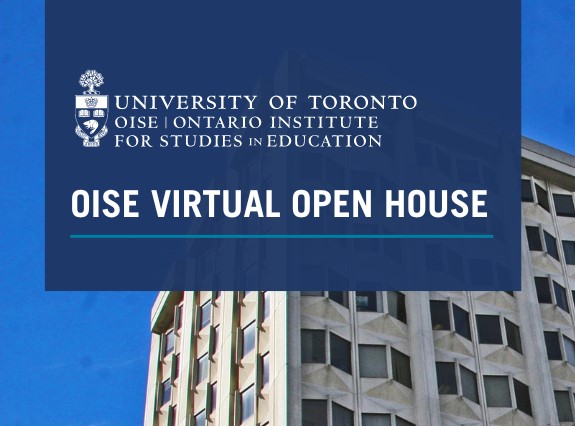Master of Education in Curriculum & Pedagogy

Master of Education in Curriculum & Pedagogy Overview
The Master of Education in Curriculum & Pedagogy program (C&P) is a forum for systematic reflection on curriculum, viewed in the broadest sense as educational experiences that occur in both formal and informal settings. This includes a critical examination of the substance (subject matter, courses, programs of study), purposes, and practices used for bringing about learning in educational settings.
Students enrolled in the Master of Education in Curriculum & Pedagogy program are required to complete ten half-courses, which may be taken on a full or part-time basis. Additional coursework may be required depending on previous experience and academic qualifications. Given the diverse academic and research interests of our faculty, the program is organized into six constituent but optional program Emphases. All requirements for the degree must be completed within three years of enrolment for full-time students, and within six years for part-time students.
Curriculum & Pedagogy Program Emphases
The Curriculum & Pedagogy program (C&P) offers the following six optional program Emphases to all students admitted to the program:
- Arts in Education
- Critical Studies in Curriculum and Pedagogy
- Digital Technologies in Education
- Indigenous Education and Decolonization
- Science, Mathematics and Technology in Education
- Wellbeing
Students interested in completing a C&P Emphasis must take 3 courses from a list of courses affiliated with the Emphasis. Students who successfully complete Emphasis coursework as part of their C&P degree requirements may request a notation of the Emphasis on their transcript.
For detailed information about the program, please consult the School of Graduate Studies Calendar.
At a Glance
Study Options
Full-time (4 sessions)
Part-time (10 sessions)
Coursework (10 half courses)
Funding and Tuition
For current information about tuition fees, funding, and financial support, visit Tuition & Financial Support.
Application Deadline
To view current application deadlines, visit the OISE application deadlines and closing dates page.

Apply
Ready to join one of the world’s top universities? Take the next step in your academic journey and start your application to graduate studies at OISE.
Speak with our Team
Have questions about our program, admissions, financial support or career options after graduation? Our team has the answer you’re looking for. Contact us for one-on-one support.
Attend an Info Session
We host information sessions, open houses and tours throughout the year. Come discover what it's like to study at OISE. Explore campus and meet our community.
C&P Admissions Drop-In
Have a question about admissions requirements?
Email us at ctladmissions.oise@utoronto.ca
Drop-in (online) and speak to program staff.
Thursdays from 12:00 p.m. to 1:00 p.m. (EST)
Why I Chose Curriculum, Teaching & Learning

Themis Aravossitas (Master of Arts 2010, Doctor of Philosophy 2016)
Lecturer
Curriculum & Pedagogy
"I was admitted into the Master of Education program… an internationally educated teacher who needed to gain experience in the Canadian context. CTL's faculty, staff and fellow students gave me a sense of belonging within an inclusive and supportive academic community. I worked with and got inspired by world class scholars, and participated in the organization of conferences and symposia, book publications, grant submissions and educational collaboration involving new technologies. Through OISE and particularly CTL, I built a professional network and became confident about my studies and potential career."
Master of Education in Curriculum & Pedagogy Admission Requirements
General Admission Requirements
Please visit the OISE Admissions website for detailed information about the application process, including general minimum admission requirements and supporting documents.
Program-Specific Information (Minimum Admission Requirements)
Minimum admission requirements for this program are:
- An appropriate honours bachelor’s degree (4-year) or equivalent with standing equivalent to a University of Toronto mid-B or better in the final year or over senior courses.
- English Language Proficiency (if required)
- Please see the SGS calendar for more details.
We encourage equity-seeking groups to identify themselves in their application.
Required Supporting Documents
All applicants must submit:
- Online Application
- Transcript(s) from each post-secondary institution attended
- Two letters of reference from two separate people (one academic and one professional)
- A résumé that provides clear and complete information about the applicant's work or field experience related to their proposed studies
- Completion of program application questions (ie. "Faculty Questions: CTL" below)
- In 1,000-1,500 words, describe why you wish to undertake a graduate program in Curriculum & Pedagogy. Please tell us about your background, your work in education, and your study interests.
- Based on what you shared in the previous question, list 3-5 keywords to describe your research interests.
- If you are interested in a Program Emphasis, you will be asked to indicate them
- Is there any additional information you would like to share with the Admissions Committee that will inform their review of your application?
- View FAQ for other important application notes.
Additional Admissions Information
We are looking for applicants who have a sound academic background and a deep interest in education. Our degree is designed for a wide range of educational experiences/work that includes but is not limited to teachers, health workers, community-based educators, educational activists, school board administrators, post-secondary faculty, individuals in corporate and not-for-profit industries, and people in other education-related fields.
Applicants should have demonstrated commitment to education prior to applying. Please note, the Master of Education program is not a teacher certification program. For more information on our teacher certification programs please visit: OISE Teacher Education Degrees.
The Curriculum & Pedagogy program is designed for flexibility. Choose courses that best meet your needs. The program details are as follows:
- A C&P MEd degree requires ten completed courses. There is no thesis requirement.
- There is one required course: CTL1000H - Foundations of Curriculum.
- At least five of the ten courses must be Curriculum & Pedagogy courses. C&P courses are identified with CTL1000-level course codes (i.e CTL1000H to CTL1999H) and Special Topics courses in C&P are identified as CTL5000H to CTL5299H (Masters Level) and CTL6000H to CTL6299H (Doctoral Level).
- Non-C&P courses (if you choose to take them) can include Masters-level courses from the Languages and Literacies Education program or from any other OISE departments: Social Justice Education, Applied Psychology & Human Development, and Leadership, Higher, and Adult Education.
Enjoy courses that explore different aspects of teaching and learning. We offer courses in aboriginal education, equity and diversity issues, arts in education, educational technology, curriculum, environmental education, well-being, and more. Think critically about both the possibilities and challenges surrounding issues that matter in education.
Given the diverse academic and research interests of our faculty, the program is organized into seven constituent but optional program Emphases.
The Curriculum & Pedagogy program (C&P) offers the following six program Emphases:
- Arts in Education
- Critical Studies in Curriculum and Pedagogy
- Digital Technologies in Education
- Indigenous Education and Decolonization
- Science, Mathematics and Technology in Education
- Wellbeing
Students in the C&P program interested in a C&P Emphasis are required to take 3 courses from a list of courses affiliated with the Emphasis. Students who successfully complete Emphasis coursework as part of their C&P degree requirements may contact a department administrator, prior to graduation, to request a notation of the Emphasis on their transcript.
Interested in interdisciplinary study?
UofT offers collaborative specializations which involve the cooperation of two or more graduate units (i.e Departments, programs, or centres). Students admitted to C&P have the opportunity to discover the research possibilities available with the following collaborative programs:
We welcome applications from outside Canada. For more on international student admissions please review International Applicants on the OISE Registrar's office website. The University of Toronto School of Graduate Studies has provided an assessment tool that allows International Applicants to determine the equivalency of their academic credentials.
International students will be required to purchase a University Health Insurance Plan (UHIP) for the duration of their academic study. Please note that UHIP does not cover all the costs in an Ontario Health Insurance Plan (OHIP). Contact the UHIP office for more information about the plan's coverage and fees.
As an International Student, available funding is limited. International students will not be able to apply for OSAP but can apply for bursaries and emergency funding. Please contact Student Experience on the 8th floor of the OISE building.
Centre for International Experience - The Centre is located at 33 St. George Street. The Centre provides guidance for International Students studying abroad in Toronto including visas, health insurance, financial aid, and housing. The centre is also used by both International and domestic students for many events including social and cultural.
The following is the result of a question and answer (Q&A) discussion which took place following a C&P MEd Open House presentation.
Is there a part-time option for this program?
Yes, students can choose part-time or full-time registration status and choose maximum course load based on your registration status. See OISE Registrar's Office & Student Experience (ROSE) for maximum course load.
How do students gain supervisors?
The C&P MEd degree is a non-thesis, course only degree so you do not have a supervisor that you work one on one with. Instead you have a Faculty Advisor that you can speak with if you have questions regarding program requirements, course selection etc.
What should I include in my resumé?
Your resumé should describe your education history (both academic and professional), employment history (including names of employers, job titles, position responsibilities, dates employed, whether full- or part-time), awards, business and professional achievements, community activities, as well as any special skills.
If unable to provide an academic reference, would two professional ones work instead?
While a minimum of two letters of reference – one academic and one professional – should be included in your application, sometimes applicants experience difficulty obtaining a letter of reference. For example, if you graduated many years ago and have since not been active in an academic setting you may be unable to call upon a university instructor with whom you studied. You're strongly encouraged to obtain one academic and one professional letter of reference, but you may submit an alternative combination such as two reference letters from a professional source. Tip: for two professional letters direct the most suitable referee to include comments pertaining to your intellectual abilities and potential.
Can you switch to PT or FT half way?
Yes, you can request to change your registration status from PT to FT or FT to PT. You must contact your Registration Specialist in the OISE Registrar's Office & Student Experience (ROSE) and make the request to change your registration status. Please keep in mind that changing your registration status will affect your registration fees; contact your Registration Specialist of details: oise.registration@utoronto.ca.
Can I complete the MEd at a distance?
You can do that. Although not guaranteed, there are normally enough courses available online to complete the degree.
Does this program lead to PhD since it is course based without a thesis?
The answer to that is yes, but it's good if you try to do some additional things during your program. For instance, engage with research groups, Research centres, and faculty doing research where possible. What we're looking for at the PhD level is whether you're ready to come in and do a research doctorate. So, it's trying to find that experience in addition to your coursework, but people have done that and continue to and we have admitted MEd students into our doctoral program.
What are collaborative specializations?
Collaborative Specialization programs are created by participating graduate units to explore a novel interdisciplinary area or special development that crosses a number of disciplines. If you are admitted into a graduate program that participates in a collaborative specialization; many of which are actually University of Toronto wide specializations to which CTL is very closely connected; you can apply to a collaborative specialization, but you need to apply to them directly. If you review our website, and websites of affiliated collaborative specializations, you’ll see C&P participates in a number of collaborative specializations.
Is the MEd Field in Online Teaching and Learning available to folks outside of the Curriculum & Pedagogy program?
You must apply to the C&P MEd Field in Online Teaching and Learning (OTL) to be admitted to, and graduate, from this degree Field. Unlike collaborative specializations where students from all affiliated graduate units can participate, this MEd Field in OTL degree is only available as part of our Curriculum & Pedagogy program. Some courses in the Field are restricted to students admitted to the C&P MEd Field only, so if you do have an interest in online learning this is a very good program for you to explore that interest.
I have a question about language proficiency. I’ve been working as an occasional teacher for four years here, but finished education outside of Canada. Do I still need to prove language proficiency?
As English is the primary language of instruction and communication at the University of Toronto, applicants must demonstrate an adequate level of proficiency in English, regardless of their citizenship status or country of origin. It is important that these students follow School of Graduate Studies (SGS) policies on English Language Proficiency (ELP) testing requirements and take one of the required tests for admission to a graduate program. Applicants from universities outside Canada where English is not the primary language of instruction must provide results of an English language proficiency examination as part of their application. Tests must have been taken within the last 24 months at the time of submission of their application.
The determination of whether an English language proficiency test is required is determined by the admissions division of the OISE Registrar's Office and Student Experience (ROSE), but only after the application has been submitted. Visit the SGS webpage on English language proficiency for more information.
What is the difference between Masters of Teaching degree and the MEd?
The Master of Teaching is actually a different program. That is our teaching program which offers a master's degree and Ontario Teaching Certification for classroom teaching. This is a program where if you wanted to go into teaching as a career you would pursue a master's degree there. That is not an option in our Curriculum & Pedagogy program.
Common career pathways for MEd graduates?
Graduates of the C&P MEd degree have pursued careers in the following areas and beyond: Advocacy, Community development, Curriculum analyst, Curriculum developer/instructional designer, Early childhood development, Education administration, Education NGOs, Education/learning consultant, Educational technology, Government positions (Ministry of Education, MP, MPP, etc…), Indigenous Education, International Comparative Education, Librarian (need additional qualifications: Library and Information Services degree), Museum educator, Program evaluation, Public outreach, Researcher, School boards (trustee), Study abroad programs, Teacher (need teaching certification; TEFL or for the province/state you want to teach in), Teacher training programs, Textbook writer/proofreader (e.g. Harper Collins), Urban education.
What happens after I submit my applications?
Once you've completed your application, understand what happens next by visiting After Submitting Your Application.
I was offered admission, what are my next steps?
Applicants who receive an official "Offer of Admission" result letter can view the Newly Admitted Students webpage for information on next steps.
New Optional Master of Education (MEd) Field: Online Teaching and Learning
The field in Online Teaching and Learning is designed for students interested in engaging with scholarly research in distance education who want to learn how to effectively instruct and design online courses. This field is committed to helping each graduate student become an impactful online instructor who designs powerful online experiences through the judicial and effective use of new technologies.
Students pursuing this field will graduate with:
- a solid theoretical and intellectual grounding in research relating to online teaching and learning;
- a course-based, practitioner focus on the design and delivery of online instructions; and
- the opportunity to develop proficiency with a wide variety of modern online technologies.
This combination of theoretical, scholarly, and practical experiences will allow graduates to apply for teaching positions and/or progress in their career in a number of online education contexts, such as online mentor, designer of online curriculum, online K-12 educator, and online workplace trainer. For those graduates already working in online contexts, the field on Online Teaching and Learning, clearly noted on graduates' transcripts, will support their career advancement.
The C&P MEd Field in Online Teaching and Learning consists of 10 half courses.
All students in the field will be required to take:
- CTL1000H: Foundations of Curriculum Studies
- CTL5016H: Instructional Design of Online Courses
- CTL1620H:Theoretical Foundations of Online Teaching and Learning
Students must then choose any 3 from this list of courses:
- CTL1603H: Introduction to Knowledge building
- CTL1606H: Computers in the Curriculum
- CTL1608H: Constructive Learning and Design of Online Environments
- CTL1609H: Educational Applications of Computer-Mediated Communication
- CTL1926H: Knowledge Media and Learning
- CTL1615H: Introduction to Artificial Intelligence in Education
- CTL1616H: Blended Learning: Issues and Applications
- CTL1617H: Social Media and Education
- CTL1625H: Digital Media and Practices for a Knowledge Society
- CTL1623H: Immersive Technology in Education: Virtual Reality and Augmented Reality Applications
- CTL1621H: Design and Development of Online Content, Media, and Artifacts
- CTL1622H: Data Gathering and Assessment in Online Courses
For the other four half courses that comprise the MEd in C&P, students in the field will enjoy the same flexibility as students in the general program and may choose other C&P or non-C&P courses.
As part of their electives, C&P students in the Master of Education program are eligible to participate in any of the Collaborative Specializations available. Students who participate in the new Online Teaching and Learning field will have sufficient elective space (4 half courses) to fulfill the requirements of any of the Collaborative Specializations.
Ready to join one of the world’s top universities?
Take the next step in your academic journey and start your application to graduate studies at OISE.